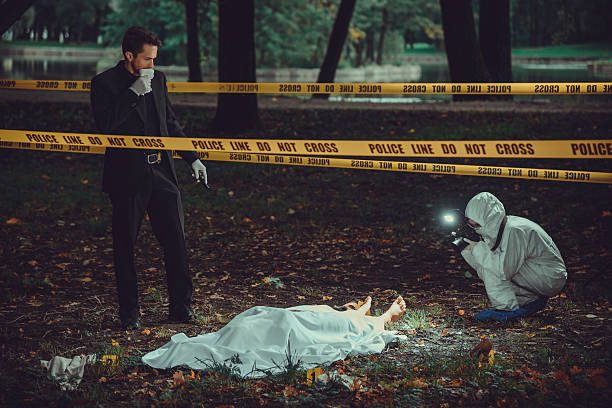
| Crime Scene Investigator Key Stats | |
|---|---|
| Education | 4+ Years |
| Job Outlook | 14% |
If you are intrigued by law enforcement, have an investigator’s eye, and want a job that allows you to give back to the community, then you might like to become a crime scene investigator.
A crime scene investigator is a specialist in evidence.
When a crime happens, they are called to the scene to collect evidence, and examine the scene.
When you become a crime scene investigator, you take on an important role.
You have the opportunity to bring criminals to justice, and to help take them off the streets.
The evidence collected will be the basis for charges made against a defendant and will greatly affect an outcome in court.
A crime scene investigator, sometimes known as a forensic investigator or CSI, is probably one of the most well known careers in law enforcement due to the many television shows dedicated to this subject.
Table of Contents
Education Requirements to Become a Crime Scene Investigator
Most crime scene investigators are promoted from other areas of law enforcement; however some civilians enter this occupation without previous training.
There are a few opportunities in crime scene investigation where a high school diploma or GED may be enough to gain you entry to this occupation, but for the most part you will need some post-secondary training.
To become a crime scene investigator you will need to have either a two year associate’s degree from community college, or a four year bachelor’s crime scene investigation degree.
Criminal justice, law enforcement, and forensic science all make ideal majors.
Courses in psychology, biology, and chemistry are also helpful if you want to work in a laboratory setting.
While you’re at college, completing internships with law enforcement agencies can be very helpful.
You’ll gain experience, and also make contacts which may be helpful in finding you a job later on.
Usually, you will need to apply to law enforcement agencies, your admission will be judged on your academic transcript, an application examination, and an interview.
Before you start work you may also need to undergo psychological and medical screening.
Crime Scene Investigator Job Description
A crime scene investigator is called out to the scene of a crime.
It could be a homicide, an assault, or an accident.
If not already done, the CSI will secure the site of the crime, and make sure it is safe for themselves, their colleagues, and any members of the press or public.
Crime scene investigators work all hours of the day and night, and are often on call.
While you may work a 40 hour week some of the time, there are other times when big cases break that you will work long hours.
Most crime scene investigators have a special skill base.
For instance, they could be a latent print examiner, a blood splatter expert, or a crime scene photographer.
In some law enforcement agencies, one CSI will complete all of these duties, in larger department there will be many experts on board to take different tasks to hand.
Here are some typical duties of a crime scene investigator:
- Secure the scene of a crime
- Take photographs of a crime scene
- Check for evidence such as DNA and fingerprints
- Collect and identify samples of tissue and other biological material
- Collect ballistics evidence
- Make a report on a crime scene
- Prepare evidence to send for further testing
Crime Scene Investigator Salary and Career Path
When you become a crime scene investigator, you will start your career with a more experienced partner.
This will give you a good opportunity to learn the role with someone who has plenty of experience.
Many roles will begin with a probationary trial period.
While you will always work with a partner, after you gain some experience, you will have greater responsibilities within cases.
The greater your skills and track record, the higher the profile of the cases you will be assigned.
There are other fields of law enforcement that you might like to specialize in.
For instance, many CSI’s are forensic experts in other fields of crime scene investigation.
You might like to focus on a different area later in your career.
Some crime scene investigators move on to supervisory areas within law enforcement later on also.
The median salary of a crime scene investigator is about $52,000 a year.
Here are some similar roles to that of a crime scene investigator:
If you’re interested in law enforcement, want to serve your community, and think the detail orientated work is something you would excel at, you might like to become a crime scene investigator.
There are jobs across the country with good pay and secure employment for those who become successful candidates.
![]() The below information is based on the 2023 BLS national averages.
The below information is based on the 2023 BLS national averages.
National Average Salary
$95,930Average Salary by State
| State | Avg. Annual Salary |
|---|---|
| Alabama | $76,990 |
| Alaska | $121,770 |
| Arizona | $94,190 |
| Arkansas | $63,040 |
| California | $115,910 |
| Colorado | $99,780 |
| Connecticut | $100,530 |
| Delaware | $101,440 |
| Florida | $88,610 |
| Georgia | $71,610 |
| Hawaii | $121,000 |
| Idaho | $83,270 |
| Illinois | $95,820 |
| Indiana | $74,780 |
| Iowa | $84,090 |
| Kansas | $70,570 |
| Kentucky | $78,850 |
| Louisiana | $73,680 |
| Maine | $87,010 |
| Maryland | $119,900 |
| Massachusetts | $112,480 |
| Michigan | $99,450 |
| Minnesota | $85,390 |
| Mississippi | $64,580 |
| Missouri | $80,910 |
| Montana | $91,590 |
| Nebraska | $93,840 |
| Nevada | $95,380 |
| New Hampshire | $88,460 |
| New Jersey | $107,910 |
| New Mexico | $82,700 |
| New York | $118,350 |
| North Carolina | $71,870 |
| North Dakota | $82,240 |
| Ohio | $88,170 |
| Oklahoma | $82,610 |
| Oregon | $106,320 |
| Pennsylvania | $98,160 |
| Rhode Island | $96,290 |
| South Carolina | $73,600 |
| South Dakota | $84,000 |
| Tennessee | $76,680 |
| Texas | $88,300 |
| Utah | $87,620 |
| Vermont | $99,200 |
| Virginia | $106,850 |
| Washington | $114,450 |
| West Virginia | $92,110 |
| Wisconsin | $88,660 |
| Wyoming | $84,910 |
| Puerto Rico | $81,910 |
The top earning state in the field is Alaska, where the average salary is $121,770.
These are the top 5 highest-paying states in the field:
* Employment conditions in your area may vary.
Frequently Asked Questions
What is a Crime Scene Investigator?
Crime scene investigators collect and analyze evidence in order to help detectives solve criminal cases.
They analyze crime scenes to determine what evidence should be collected and how, take photographs of crime scenes and evidence, make sketches, record their findings, collect and preserve evidence and reconstruct crime scenes.
Crime scene investigators, sometimes also called criminalists, may also perform lab tests and analyze evidence.
They must be detail-oriented persons with good communication and critical-thinking skills.
A solid understanding of math and science and good problem-solving skills are also needed.
How much does a Crime Scene Investigator make?
According to the Bureau of Labor Statistics, the median annual salary for forensic scientists was $58,230 in May of 2018.
How much a crime scene investigator makes depends on their level of experience and the industry where they are employed.
The lowest 10 percent earned less than $34,600, while the top 10 percent earned more than $97,200.
Crime scene investigators may work day, evening or night shifts and may work overtime if they are called to collect or analyze evidence.
How much does it cost to become a Crime Scene Investigator?
Crime scene investigators, like all forensic scientists, need at least a bachelor’s degree in chemistry, biology, forensic science or a related field.
Many of those who seek employment in the field have an undergraduate degree in science and a master’s degree in forensic science.
Getting your bachelor’s degree in science costs, on average $36,400 a year at a public college and an average of $47,000 a year at a private college.
Tuition for a master’s degree program in forensic science can vary between $11,000 a year for in-state students at a public university, to more than $25,000 a year at a private university.
In order to make sure that you receive the best possible education, you should enroll at a reliable school that is accredited by government institutes.
What is the demand for Crime Scene Investigators?
According to the Bureau of Labor Statistics, the demand for forensic science technicians is expected to grow 14% from 2018 to 2028.
However, the demand for crime scene investigators depends on the level of government spending and varies region by region and year by year.
State and local governments may hire additional forensic scientists in the future to help solve cases.
Competition is expected to be strong and holding a master’s degree should increase your chances of finding employment in the field.
How long does it take to become a Crime Scene Investigator?
In order to become a Crime Scene Investigator, you will need at least a bachelor’s degree in forensic science, chemistry or a related field.
Getting your bachelor’s degree in criminal justice takes around 3-4 years.
In order to improve your employability, you should also consider getting a master’s degree.
Obtaining a master’s degree in forensic science takes around 2 years.
Crime scene investigators also receive on-the-job training.
They usually work under the supervision of an experienced investigator for several months before they are ready to work independently on cases.
Crime scene investigators have to participate in continuing education classes throughout their career to keep up with technological and scientific advances.













